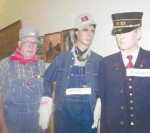Buffalo Commons -- Storytelling not just for the professionals

Have a good story about the McCook Army Airbase? The railroad? How about McCook's early baseball teams, school memories at Eastward, or Harry Strunk?
It's all fair game at the open mike sessions of the Buffalo Commons Story-telling Festival, one of several free events scheduled for the festival.
Members of the public are invited to bring their own recollections to "Close to the Bone" at the Bieroc Cafe Saturday, June 9 at 12:30 p.m., where locals can match tales of the past in celebration of McCook's 125th Birthday.
And if you have a memory about the railroad, stop over at the Museum of the High Plains, 413 Norris Ave., at 9 a.m., when John Hubert hosts "Smoke on Steel -- Railroad Stories."
"Railroad Stories" will begin with stories about the Pioneer Zephyr, the first non-stop commercial train from Denver to Chicago in 1934.
Other stories about the railroad are welcome as well, Hubert said, considering the huge impact the railroad had on McCook and the community.
"If it hadn't been for the railroad, there would be no McCook," Hubert said, a retired railroader after 40 years on the tracks. The railroad, like for many families in McCook, involved several generations of the Hubert family, with his father employed for many years and now his son.
"Living Close to the Bone" at the Bieroc will be hosted by Cloyd Clark and Merrill Ream and has become an extremely popular event at the story telling festival, said Mary Ellen Goodenberger, Buffalo Commons member. This year, long-time McCook citizen Veldron Hall will start things off with memories of the 1935 flood that occurred when she was 15.
But other stories can be shared about almost anything, Goodenberger said, whether it's a personal story about a mother's ingenuity during the Depression or an amusing family vacation trip in the 1970s. Telling a good story is a way for a community to knit together, she said.
Past stories at the Bieroc have included memorable tales about blizzards, pioneers, railroaders, teachers and their students. And the stories don't have to be long-winded to be significant, she added, or include major events. Sometimes it's the small moments that make a big impression, she said.
As an example, Goodenberger shared a story she told last year at the festival, an answer to the government always telling farmers to diversify their land and make it attractive to hunters.
Goodenberger had just returned to her farm from heart surgery and noticed how tall the musk thistle had grown since she had left. As she was under strict orders not to do anything too strenuous, chopping it down was not an option. Still, as muskthistle is a noxious weed, with each seedhead containing thousands of seeds, she couldn't just sit back and do nothing, she reasoned. So she pulled out a chair and sat in the middle of a patch of thistle and proceeded to carefully -- not too strenuously -- cut off the head of each plant.
A hunter came buy and asked her, slightly incredulous, why she was out in the middle of a field. She explained what she was attempting and the hunter, who worked as a pharmacist, was amazed. His own mother, he explained, was younger than Goodenberger's 77 years but had already given up on life. Inconsolable, she had asked her son to make a "euthanizing" potion, much to his sadness.
In the middle of the thistle patch, both the hunter and Goodenberger had a good cry, she said, sharing their sorrow over his mothers' hopelessness and her own grief over her husband's recent death.
Often, hunters return year after year to the same land to hunt, but Goodenberger never saw this particular hunter again, she said. It proves her point that "We were made to connect -- it's not good to be alone."
"I often wondered what happened to him," she concluded.
Goodenberger said these stories just aren't for oldtimers, either. Some of the accounts can be pretty exciting, she said, that children would love to hear.
Additional free events include informal workshops at the Museum of the High Plains with festival headliners. "Laugh, Learn and Love," with Bill Harley, Grammy-award winning storyteller, begins at 10 a.m., followed by "Red Hot Fun" with the Wells Family at 11 a.m.
Both can be seen again, free of charge, at the Norris Park Bandshell, beginning at 2:30 p.m.
